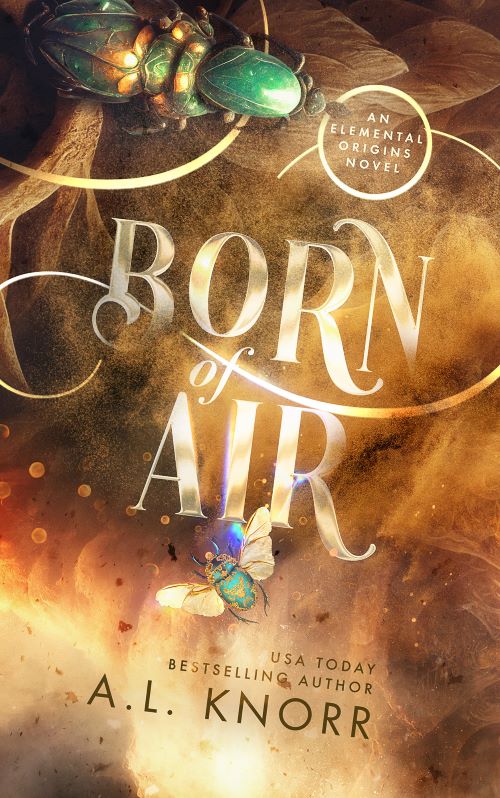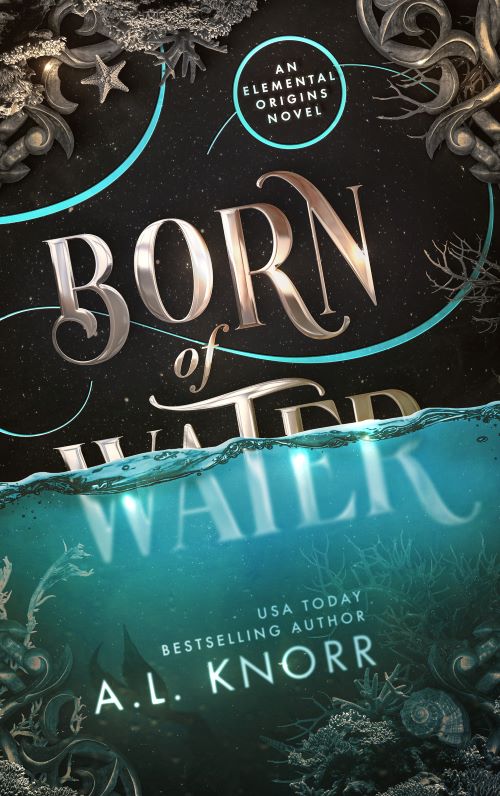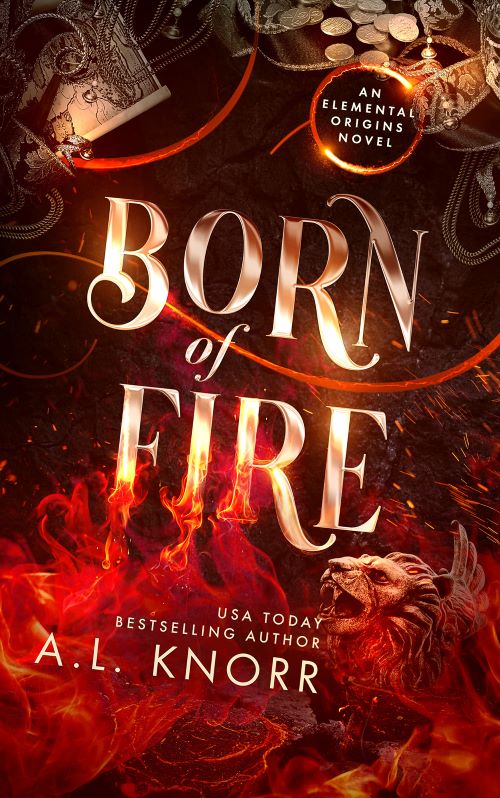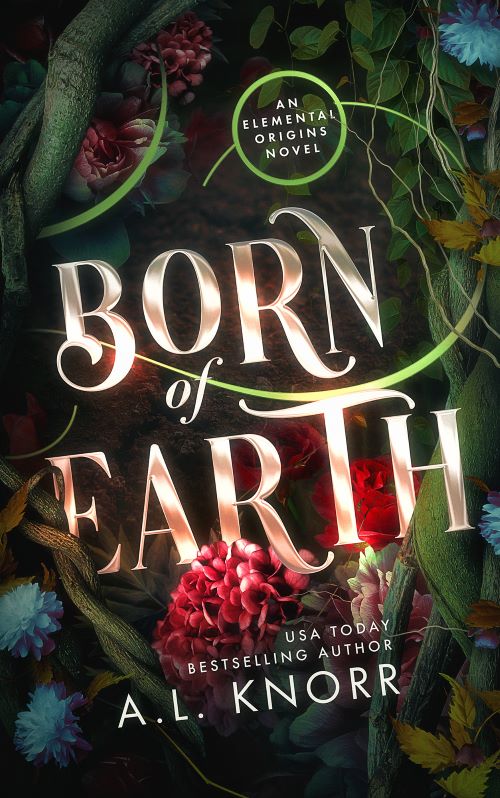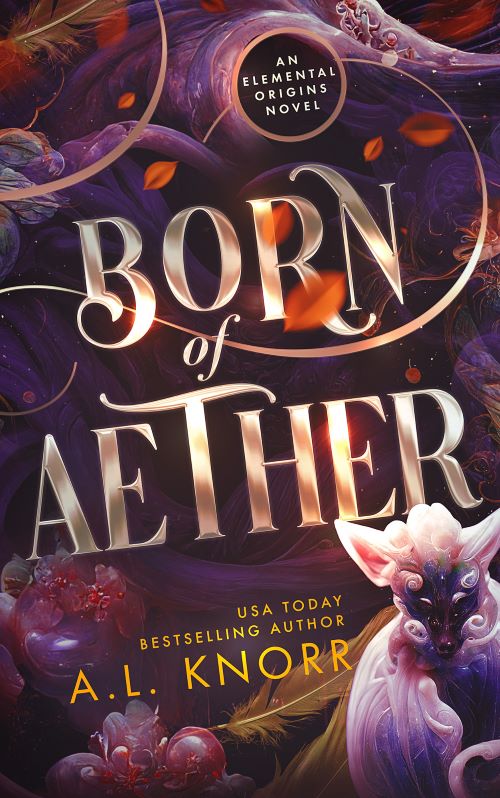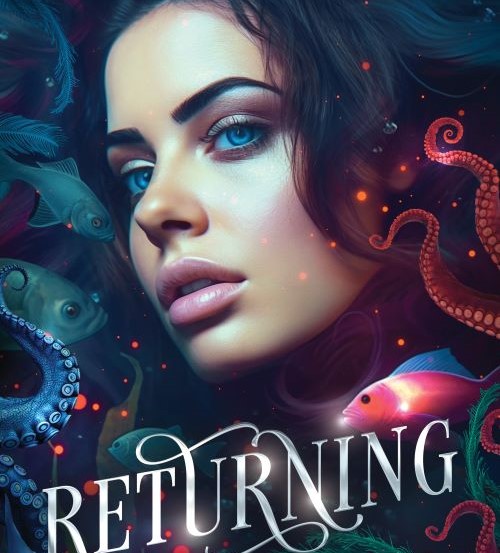Born of Air
Elemental Origins – Book V
A terrifying family secret will awaken her power. Embracing it may cost Petra her life.
All Petra Kara wants in life is to study Archaeology at the University of Cambridge. And she’s so close. She’s got the grades, she’s got the ambition. She just needs an outrageous sum of money, and experience on an Old World archaeological excavation. If only she could find a way to get rid of her annoying low-grade telepathy. There’s nothing Petra hates more than a cheat—and it’s too easy to cheat when you can read people’s minds.
When Petra spies an ad for a volunteer position on an excavation to North Africa, she knows its meant for her. But there is more waiting for her in Libya than broken pottery and human remains. A heart-pounding race through the desert under a sky full of stars with Jesse, her sexy dig-mate and newfound crush, ends when Petra slides into an ancient cave-system with strange stones embedded in the walls.
Where her life changes forever.
As her powers manifest, there are those who think they have a good reason to destroy her before she becomes too powerful.
Petra knows she is far more than just gales of wind. Just how old is she? Has she lived before? Who is the man in her vision with the silver eyes? But the biggest question of all is: will she survive long enough to learn who she is and what she’s really capable of?
Available in Kindle Unlimited, as an ebook, in paperback and as an audiobook. Clicking the BUY NOW button will take you to your Amazon store, with all the options.
A Must Read! I LOVED Petra’s story. Growing up, I had always wanted to be an archaeologist, so I related to a lot of her story and found it really interesting to read about her journey on the road to becoming an archaeologist! As always, Abby did a fantastic job!’ I would definitely recommend reading this book!
Elemental Origins
Series Complete
As Targa and her three best friends begin their summer vacations, they have no idea what is in store for them, but with each heading to a different far-flung destination, they’re sure to return with amazing tales. But excitement turns to disbelief as each girl transforms into a being with ancient powers…
Read an Excerpt
PROLOGUE
Saltford, New Year’s Eve 1998
THE NIGHT WAS cold and sharp, and the stars winked down from a black velvet sky, almost snapping with clarity. The main custodian of St. Joseph’s Hospital for nearly twenty years had just reached into the pocket of his parka for the keys to his truck when the sound of footsteps pounding behind him made him turn.
“Amin, wait!” A red-faced nurse, out of breath and with a hand over her heart, reached him and put a hand on his shoulder.
“Steady on, Irene,” said Amin, grasping her by the elbow, his bushy salt-and-pepper brows drawing together with concern. Irene was not a young woman anymore and her girth had increased over the twelve years she and Amin had worked together. She wouldn’t be moving this fast without good reason. “Everything okay?”
Irene and Amin were two of only a handful of staff members at the hospital who called each other by their first names and paid no heed to the hierarchy that segregated most of the staff. It was the reason Irene had been sent to fetch Amin, and not some other nurse.
Irene shook her head, panting, her brow creased with worry. “I’m sorry, I know you’re on your way home and it’s New Year’s Eve, but we have a situation we could use your help with.”
“Of course.” Amin waited while the nurse took a few more breaths to calm herself.
“We’ve got young woman in the ER who is in labor. She doesn’t speak any English. We think her language might be Arabic, but it’s difficult to tell. You speak Arabic, right?”
Amin frowned. “My parents did, but I’ve forgotten most of it.” “That’s more than anyone else here can say. Would you please come and see if you can translate?”
Amin nodded and the two ran back to the hospital’s rear entrance while Irene caught Amin up on some of the details. “A young couple heard sounds of distress coming from their back alley. They discovered her hiding in some brush there.”
“Hiding?” Amin echoed, his brow furrowing.
“That’s what they said,” Irene huffed as they reached the door. Amin opened the doors and let her pass first. “They said it was all they could do to get her into their van. The only reason they got her here is because her water broke and she couldn’t resist them any longer.”
“Is she in her right mind?” Amin’s heart had begun to pound, but not from the jog across the parking lot.
They donned paper booties and made their way down the hall toward the ER. Irene lowered her voice. “She’s jumpier than a cat in a room full of rocking chairs. But her anxiety is only part of it. Her ankles and hands are swollen,” Irene said. “We suspect she’s pre-eclamptic.”
Amin was a janitor, not a doctor, but he’d been working in the hospital for long enough to know exactly what that meant. His stomach dropped. If the young woman was pre-eclamptic this late in the game, there was very little that could be done to help her. The focus would be on saving the baby. Amin also knew that the young woman had not yet been properly admitted; if she had been, Irene wouldn’t be allowed to tell him any of this.
“Is she homeless?”
Irene blew out a breath and shook her head, her cheeks ballooning. “You’ll be able to answer that for all of us.” They pushed their way into the ER and Amin came to a standstill.
The woman lying on the bed whipped her head toward them and gasped, cringing away from the door. Even with sweat beading her brow, she was a striking woman. She had a long neck and large dark eyes. Her swollen fingers were visible, wrapped over her belly. Expensive looking rings with large, colored stones graced her fingers, her puffy flesh pushing out on either side of the bands. It was likely the rings would have to be cut off. Diamond studs sparkled from her earlobes. Amin doubted the jewelry was fake. The woman reminded Amin of a sculpture he’d seen in a history textbook once called Nefertiti Bust. Her cheekbones were painfully high and her caramel skin was flawless save for wrinkles of pain and worry on her brow. Her dark hair was tied back in a bun at the nape of her neck, but damp flyaways had escaped and framed her face. Her lips were red and looked petal soft. She didn’t appear to be a day over twenty. A soft black cloak of fine wool swaddled her pregnant form. Whatever shoes she’d had on had been removed. Amin could see the thickness of her swollen ankles above the elastic of the paper booties on her feet.
Medical staff rushed about, and equipment was clustered around the bed, including an ultrasound and a fetal monitor. Three more staff stood back against the wall, scrubbed and prepped and ready for a C-section if needed.
“Min ‘anat?” she said in a dialect of Levantine Arabic. Who are you? Her voice quavered and concern swept over Amin like a heavy cloak.
Amin took a few steps forward, whipping the gray knit cap off his head. “My name is Amin,” he said in halting Arabic, his face soft with compassion. “My Arabic is old,” he apologized, “and a little different from yours.”
“Did they send you?” Her arms closed protectively over her belly. Amin was confused by this phrasing and thought perhaps he’d misunderstood her. His Arabic was pitifully rusty. “Nurse Irene came to get me because I speak a little Arabic,” Amin replied, putting a hand out. “I’m a custodian here. What is your name?”
Her face softened, just a little, but she didn’t answer. Amin watched her face tighten and transform into a mask of pain and she ducked her chin to her chest and groaned.
“Nurse,” Amin said, feeling panic sneaking up on him. He’d never been good at seeing people in pain, especially women. “Help her.”
“We’re trying,” answered one of the doctors. “That’s why you’re here. Can you convince her to let us get her out of her clothes? If we can at least get that far—“
Amin nodded. He relayed this to the woman. “Baby wants to come,” he said gently in his rusty Arabic. “This is Irene,” Amin put a hand on the nurse’s shoulder. “She is a good nurse. She’d like to help you change.”
To their relief, the woman nodded, still with her face down. She began to pant again.
“I’ll be just outside,” said Amin. On his way out the ER, Amin paused to tell the doctor, “She sounds Jordanian.”
The doctor nodded. “Thanks, I’ll make a note. That’s helpful.”
Amin ducked out of the room to allow them to undress the woman and get her into a proper hospital gown. He waited, twisting his hat into a wrinkled mess, until he was asked back in.
When he stepped into the room, the sound of a distant helicopter passing somewhere overhead made the woman cringe and her eyes dart to the window. She pinched her lips between her teeth as a keening sound rose in her throat. One of the ER nurses was drawing blood and put a hand on her shoulder to keep her still. All of the staff looked grave. Several IV lines had been inserted into the woman in Amin’s short absence, and snaked up from the bed to various bags of liquid.
“It’s all right. It’s just a—“ Amin had to think before remembering there was no Arabic word for helicopter. He said the English word with an Arabic accent, hilykubtr. He approached the bed, as close as he thought she’d allow.
Amin asked the woman again. “Would you please tell us your name?”
She rolled her eyes up at him, panting. For a moment he thought she wouldn’t answer. “Tala,” she said, finally.
“Her name is Tala,” said Amin to the staff. He smiled encouragingly at the young woman.
“Thank you,” said one of the nurses.
“Tala,” Irene echoed, rubbing Tala’s back. “That’s a girl. We’re going to take good care of you.”
Emboldened by the success of getting her first name. Amin tried for more information. “What is you family name? Is there someone we can contact for you? The father, perhaps?”
“No father!” the woman snapped as her face and body tightened again with another contraction. She opened her eyes to glare at him. “There was no father! Never a father! No more questions!”
Amin looked up at Irene, bemused. “She says there was never a father, and she doesn’t want me to ask her any more questions.”
“Never a father,” echoed Irene. “That’s a first.”
“One of the symptoms of eclampsia is confusion,” offered one of the other ER nurses.
“Either that or my Arabic is worse than I thought.” Amin swallowed hard, looking at the young woman and feeling helpless.
“Best leave,” said Irene. “We can’t have her any more upset than she already is.”
As Amin took his leave, the sounds of the woman’s cries followed him down the hall. Amin paced in the waiting room just the way thousands of expectant fathers had done for forty years before him. Five and a half hours passed before Irene emerged. Midnight had passed and the new year had begun. Amin had barely noticed. He got up from his chair as Irene came through the double doors, and his back protested with a creak.
“I thought you’d gone home,” Irene said. Her face was pale and drawn, her shoulders stooped with exhaustion.
“I was hoping I could help again, after the birth.”
“Thank you, Amin. That’s very kind.” Irene rubbed a hand over her brow. “We lost her.”
Amin sat back down, his body suddenly feeling too heavy for his legs.
“Nothing could be done. Team’s trying to track down her records to see if she’d been admitted anywhere else, or possibly had a OBGYN in the city.”
“And the baby?”
“Underweight, but otherwise okay. She’ll be in intensive care for a little while.”
“She. A little girl.”
Irene nodded and retrieved a wrinkled piece of paper from her chest pocket. “Tala asked for a piece of paper and a pen shortly after you left.”
“How?”
Irene made a gesture with her hands, which would have been perfect for a game of charades. Anyone of any language would have understood what it meant. Palm flat for paper and fingers grasping an invisible writing utensil.
“What does it mean?” Irene handed him the paper.
Amin unfolded the page to reveal the elegant swirls of Arabic, written by an unsteady hand. “Tala wrote this right after I left?”
Irene nodded. “Last thing she ever ‘said.’”
“She must have seen a health professional at some point. She knew the baby was a girl. It’s a name.” He read the name aloud to the nurse.
CHAPTER ONE
“Petra Kara. What a treat,” Noel said, standing up from behind his desk as I walked in. “I was so pleased when I saw you had booked an appointment.” He straightened his suit jacket and bounced a little on his toes.
I smiled at my old therapist. “Nice to see you too, Mr. Pierce.”
His office hadn’t changed. Old wooden paneling covered in dusty paintings of ships and sunsets lined the walls, wherever there weren’t bookshelves bursting with psychology titles. Tall warped windows with small, diamond-shaped panes blurred and rattled slightly at the rain beating down on them outside. The forest-green carpet was worn by years of feet scuffing across it, creating a lighter green path from the door, circling the space between the couches and chairs, around his desk, and out the door again. The smell of Old Spice cologne made me remember the young, scared kid I’d been when I first met Noel Pierce. He had been my assigned therapist throughout my years in foster care, and while I had resisted him at first, like most kids did, he had been patient with me. He’d come to earn my trust, and if I was really honest, I’d missed him since I’d become of legal age and left the system.
He waved a hand and circled his desk, gesturing for me to sit in one of the plush chairs. “Please, don’t go back to all that. We’ve been through too much for you to call me Mr. Pierce.”
He waited for me to sit, and then sat down facing me. He crossed one leg over the other and folded his hands in his lap.
“Sure. Noel,” I said, settling into a chair I was very familiar with. This meeting did feel a little bit different from when I’d been a minor. Instead of being a government-funded patient and ward of the childcare system, I was coming to Noel as a legal adult and paying for this session with my own money. I sure hoped it was worth it.
The paper in my jeans pocket crinkled as I sat down. On it were the three bullet points I’d come to discuss today.
“You’ve been out of foster care for over a year now,” Noel said. “You aren’t obliged to come and see me any more.” He peered over his wire-rimmed glasses at me.
“I know,” I swallowed and cleared my throat. “But I need some help with something and you were the only person I could think to talk to.” He was also the only person who was sworn to patient confidentiality. Noel was forbidden to spill the secrets I was about to share with him.
“Well.” He spread his hands out, looking pleased. “I’m flattered.
What’s going on?”
I knotted my fingers and put them on my lap, not quite sure how to begin.
Sensing my hesitation, Noel offered, “Why don’t you catch me up on the last eighteen months. I understand you’re working at the Maritime History Museum?”
I nodded. “I started working there just after Christmas 2015 while finishing up high school. I still work there, but I’ve finally graduated from just ticket sales to ticket sales and tour groups.”
“Well,” Noel nodded his approval. “This is wonderful. Well done, Petra.”
“Thanks,” I said, but I had to shove down the annoyance that threatened to rise whenever people patronized me. I didn’t bother mentioning that I had also started a dog-walking service. Exercising pets and working at the local museum was a far cry from where I wanted to be. “I had applied to Cambridge University—“
“I remember,” Noel murmured.
I nodded. Of course he did. He was the one who had to listen to me cry on the phone after I’d been accepted into their Archaeology Undergrad program but couldn’t go because there was no way I could afford it. Even with the scholarship I’d won and the savings that Beverly, my foster mom, had set aside for me before her death, I had still been dismally short of funds.
“I took the year off to work and save, and I’ll be applying again in October,” I explained. “For January 2018.”
Noel frowned and rested his chin on a hand. “We have perfectly good schools here in Canada.”
“I know. But—“
“You want the best,” he finished.
“I’ve been dreaming of Cambridge since I was a little girl. Stephen Hawking, David Attenborough, Alan Turing.” I named off the famous alumni on my fingers. “Prince Zeid Bin Ra’ad, the Jordanian Prince and UN High Commissioner for Human Rights went there.” I raised my eyebrows for emphasis.
Noel was nodding. He already knew that my birth mother had been Jordanian. His expression said he didn’t find the link very compelling.
“Not the least of which are Gertrude Caton-Thompson, Dorothy Garrod, and Winifred Lamb,” I went on, my voice growing energized at the thought of following in the footsteps of these pioneering women of archaeology—my heroes and role models.
“Don’t forget at least six known Soviet spies,” Noel murmured over his fingers.
“Very funny.”
“But why, Petra?” Noel straightened. “Why is it so important to study at Cambridge? You could already be studying at any number of very good Canadian Universities as we speak. Your grades are top notch, at least from grade nine onwards. I’m certain if you applied for funding—“
“It has to be Cambridge. If there is one thing Beverly left me with,” I said, my voice breaking over the name of my deceased foster mother and the only real parent I had ever known, “it’s that I had to do whatever I chose to do to the best of my ability.”
“I don’t think she meant you had to go to the best school—“ Noel injected.
“But I have the grades,” I said, shifting forward in my seat. “I did
get in. Money is the only problem, almost. I’m so close I can taste it!” “All right, all right.” Noel made patting motions on the air the
way he did whenever I was getting too riled up. “Yes, okay. I under‐ stand. And congratulations on being accepted.”
“Thank you,” I said.
“So then, now what? What’s your plan?”
“I have worked all during my gap year at the museum. I’ve been saving up and studying on my own—“ And living in a drafty, tiny apartment on the seedy side of town, I added in my head. Where the pipes rattled in the winter like Jacob Marley with his chains, the windows leaked, and the smell of weed was ever present from my neighbors.
“How much do you need?” “About 20,000,” I said.
“Oh,” Noel sounded pleasantly surprised. I knew what he was thinking, and I didn’t have to probe his mind to do it. Beverly had left me close to ten grand. If I’d been working and saving for a year, then it wasn’t an unachievable sum.
“Pounds,” I added.
“Oh.” This time the tone was disappointed. “Per year,” I finished, with a slight wince.
He closed his eyes. “Petra,” he began. “By the time you count your undergrad, and your master’s, a PhD could be a ten-year commitment.”
”I’ve already got a year and half’s worth saved up,” I interjected, speaking quickly.
“Almost?” he said, his face going still. “What?”
“You said money is the only problem, almost,” he reminded me. Noel might be slow to pick up on things, but it was guaranteed that he would pick them up.
“Well, there’s also the matter of wanting to go on an Old World dig,” I added, a little weakly. I began to play with the frayed threads at the rip in my Salvation Army jeans.
“An Old World dig?”
“Cambridge doesn’t require dig experience, but I’m most interested in historical archaeology—archaeology with the aid of written documents. An Old World excavation on my resume would give me a huge boost.” Opportunities for international digs were out there, but most of them required payment for a place on the dig. I couldn’t afford that. Ideally, I would be able to find a dig on which I could volunteer.
“What’s the problem?” Noel raised his eyebrows. “You’ve been a volunteer on excavations before.”

